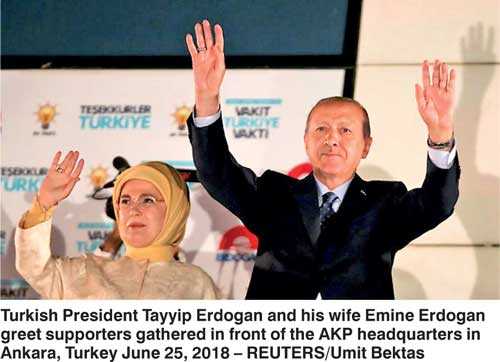Monday Feb 23, 2026
Monday Feb 23, 2026
Tuesday, 26 June 2018 00:41 - - {{hitsCtrl.values.hits}}
ANKARA (Reuters): Tayyip Erdogan won Turkey’s presidential election on Sunday, the head of the country’s electoral body said, overcoming the biggest electoral challenge to his rule in a decade and a half.
Electoral board Chairman Sadi Guven said that with more than 97 percent of votes counted, Erdogan had an absolute majority. Unofficial results broadcast on Turkish television also gave his ruling party and its alliance partner a majority in parliament.

The main opposition party did not immediately concede defeat. But after initially saying Erdogan would fall well short of a first-round victory, it said simply it would continue its democratic struggle “whatever the result”.
“Starting tomorrow, we will start working to realise the promises we made our people,” Erdogan told flag-waving supporters in a victory speech delivered from the balcony of his ruling AK Party’s headquarters in Ankara shortly after 3 a.m.
He also pledged that authorities, who have waged a nationwide crackdown since a failed military coup two years ago, would act more decisively against terrorist organisations.
Erdogan, 64, the most popular but also the most divisive politician in modern Turkey, added that Turkish forces would continue to “liberate Syrian lands” so that the 3.5 million Syrian refugees in Turkey could return home safely.
Sunday’s vote ushered in a powerful new executive presidency long sought by Erdogan and backed by a small majority of Turks in a 2017 referendum. Critics say it will further erode democracy in the NATO member state and entrench one-man rule.
Erdogan’s victory paves the way for another five-year term. Under the new constitution, he could serve a further term from 2023, taking him to 2028.
An unexpectedly strong showing by the AK Party’s alliance partner, the nationalist MHP, could translate into the stable parliamentary majority that Erdogan seeks in order to govern freely.
“This sets the stage for speeding up reforms,” Turkish Deputy Prime Minister Mehmet Simsek tweeted of the results.
The lira, which has lost about a fifth of its value against the dollar this year, firmed more than 1 percent in early trading in Asia on hopes of a stable working relationship between the president and parliament. It reached 4.587 lira to the dollar at 12:17 a.m. (2117 GMT) before easing slightly.
Erdogan’s main presidential rival, Muharrem Ince of the main opposition Republican People’s Party (CHP), had urged election monitors to remain at polling stations to help ensure against possible election fraud, as final results came in from large cities where his party typically performs strongly.
With 99 percent of votes counted in the presidential race, Erdogan had 52.5 percent, well ahead of Ince’s 31 percent, broadcasters said.
The opposition raised doubts about the accuracy and reliability of the figures released by state-run Anadolu news agency, the sole distributor of the official vote tally. But an opposition platform collating its own vote tally from monitors based at polling stations around the country broadly confirmed the Anadolu figures.
Opposition parties and NGOs had deployed up to half a million monitors at ballot boxes to try to prevent possible electoral fraud. They said election law changes and fraud allegations in the 2017 referendum raised fears about the fairness of Sunday’s elections.
Erdogan said there had been no serious voting violations.
In Sunday’s parliamentary contest, the Islamist-rooted AK Party won 42 percent and its MHP ally 11 percent, based on 99 percent of votes counted, broadcasters said.
In the opposition camp, the CHP had 23 percent and the pro-Kurdish Peoples’ Democratic Party (HDP) 11 percent - above the threshold it needs to reach to enter parliament. The opposition nationalist Iyi (Good) party received 10 percent.
Election turnout nationwide was very high at around 87 percent for both contests, the state broadcaster said.
Erdogan argues that his new powers will better enable him to tackle the nation’s economic problems and crush Kurdish rebels in southeast Turkey and in neighbouring Iraq and Syria.